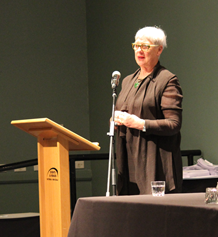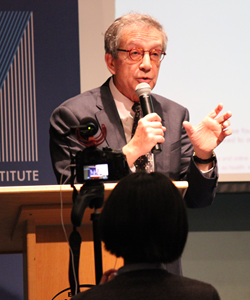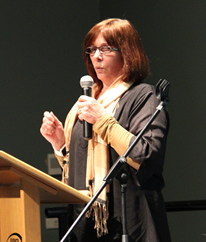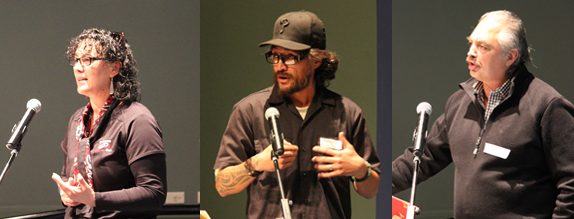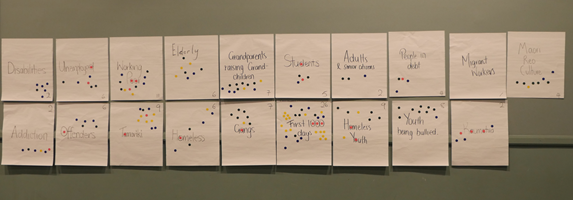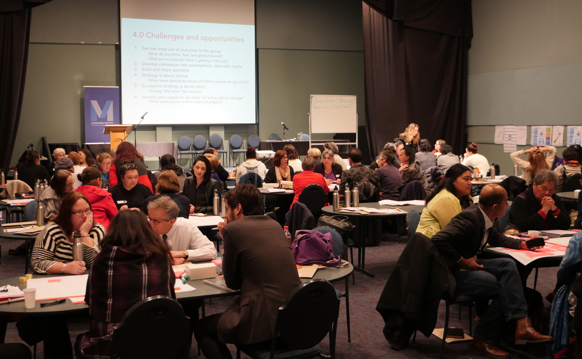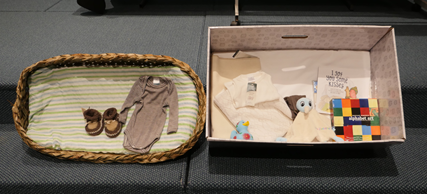As part of the McGuinness Institute’s TacklingPovertyNZ national tour, the third one-day workshop was held in Rotorua on 19 August 2016 at the Sir Howard Morrison Performing Arts Centre. The workshop was opened by Rotorua Lakes District Council Mayor Hon Steve Chadwick JP
In the morning, participants listened to six of the original 36 participants from the December 2015 TacklingPovertyNZ workshop present the booklet they produced as a result of the workshop. Participants then heard from the New Zealand Treasury’s Chief Economist Dr Girol Karacaoglu, who spoke about the need for integration between social, economic and environmental matters and shared with the group how the Treasury uses the Living Standards Framework to frame policy. He was followed by Chair of the Data Futures Partnership Working Group Dame Diane Robertson (former chief executive of Auckland City Mission), who spoke to the group about her work with the Families 100 Research Project and the factors that prevent families moving out of poverty.
Local speakers Judge Louis Bidois, Potaua Biasiny-Tule, Te Tatau o Te Arawa member and Laurie Watt from Te Arawa Whanau Ora shared their insights on poverty in Rotorua. All five speakers then moved between participant groups to discuss ideas further. Over lunch, students from Rotorua Lakes High School and Western Heights High School joined a Q & A session with either Dr Girol Karacaoglu or Dame Diane Robertson.
You can download the PowerPoints from the workshop here, or view them below.
In the afternoon, participants separated into groups to discuss issues, challenges and opportunities specific to Rotorua. Themes that emerged included the early years of a child’s life, the role of grandparents in raising their grandchildren, the working poor, Te Reo Māori culture and homelessness. Each group developed seven solutions and then presented them to the other participants to stress test their ideas.
At 4.30 pm, members of the wider community gathered at the Arts Centre to hear the speakers’ observations from the day, followed by the participants’ presentation of key ideas and local solutions.
Thank you
We hope this initiative builds and shares ideas on how to tackle poverty both within the Rotorua region and in New Zealand more generally. This event would not have been possible without local collaborators Rotorua Lakes Council and the ongoing support of the New Zealand Treasury. Special thanks also to those parties that have helped with the baby box initiative: Baby Box Co; The Wool Company from Utiku, Taihape; and Replete from Taupo.
Upcoming one-day workshops
Gisborne, Wednesday, 31 August 2016
Far North:
Kaitaia, Thursday, 15 September 2016 and
Kaikohe, Friday, 16 September 2016
Please see the TacklingPovertyNZ website for more details and how to register to attend an upcoming workshop.
About the March 2016 Queenstown workshop – Testing the process
In December 2015, the McGuinness Institute undertook a three-day workshop in collaboration with the
New Zealand Treasury. Its purpose was to explore ways to reduce poverty in New Zealand. This workshop has led to a number of outputs, one of which includes undertaking a tour of one-day workshops around New Zealand throughout 2016.
The 36 participants, aged 18–25, from the 2015 TacklingPovertyNZ workshop sparked the tour of one-day workshops as they convinced us we needed a national conversation with local solutions. The first one-day workshop was held in Queenstown on 29 March 2016, and hosted by the Queenstown Lakes District Council. The purpose was to test our approach to see if a useful outcome could be achieved in one day.
Discussion Paper 2016/01: A Queenstown Lakes District perspective on tackling poverty is now available online. A similar discussion paper will be produced from each one-day workshop, and together these papers will provide an insight into the different regional perspectives on poverty in New Zealand, in order to inform national decision-making, support local initiatives, and build and share ideas on how to tackle poverty in New Zealand.

